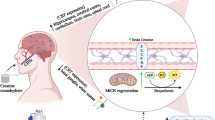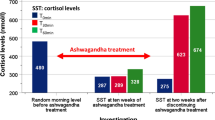Abstract
Cortisol replacement in patients with adrenal insufficiency usually consists of hydrocortisone (HC) given orally during day time. Due to the short half-life of hydrocortisone, cortisol levels between midnight and early morning are very low in contrast to the physiological rise of cortisol serum levels during this time. We investigated whether short-term cortisol replacement during the night improves cognitive function and well-being in these patients. Fourteen patients with adrenal insufficiency were put on HC infusion between midnight and 8 a.m. They subsequently underwent neurocognitive testing to measure intellectual functioning, concentration, memory and fine motor skills. Quality of life and mood were also evaluated. All tests were repeated after 2–4 weeks during usual oral glucocorticoid replacement therapy. Blood samples were taken for cortisol, epinephrine and norepinephrine measurement. With the exception of the digit symbol test with better scoring in the oral group (p = 0.005) there were no significant differences in neurocognitive testing, vegetative functions and quality of life on the two occasions. However, a higher cortisol level was associated with a worse performance in short-term memory. Plasma epinephrine concentration was subnormal in both groups, but increased only after intravenous hydrocortisone replacement. Mimicking the physiological rise in cortisol secretion during the night in this pilot study did neither significantly affect quality of life nor cognitive performance and vegetative functions. There was no improvement in general well being. Hydrocortisone infusion during night time might improve adrenomedullary reserve in patients with adrenal insufficiency.






Similar content being viewed by others
References
Al-Shoumer, K. A. S., Ali, K., Anyaoku, V., Niththyananthau, R., & Johnston, D. G. (1996). Overnight metabolic fuel deficiency in patients treated conventionally for hypopituitarism. Clinical Endocrinology, 45, 171–178.
Al-Shoumer, K. A. S., Anyaoku, V., Ali, K., & Johnston, D. G. (1997). Metabolic effects of short-term reproduction of the normal diurnal cortisol rhythm in hypopituitary adults. Endocrinology and Metabolism, 4, 207–214.
Bohn, M. C., Goldstein, M., & Black, I. B. (1986). Expression and development of phenylethanolamine-N-methyltransferase (PNMT) in rat brain stem: studies with glucocorticoids. Developmental Biology, 114, 180–193.
Bornstein, S. R., Tajima, T., Eisenhofer, T., Haidan, A., & Aguilera, G. (1999). Adrenomedullary function is severely impaired in 21-hydroxylase-deficient mice. FASEB Journal, 13, 1185–1194.
Breuner, C. W., & Orchinik, M. (2002). Plasma binding proteins as mediators of corticosteroid action in vertebrates. Journal of Endocrinology, 175, 99–112.
Brickenkamp, R. (2000). Test d2, Handanweisung. Göttingen: Hogrefe.
Bright, G. M. (1995). Corticosteroid-binding globulin influences kinetic parameters of plasma cortisol transport and clearance. Journal of Clinical Endocrinology and Metabolism, 80, 770–775.
Bright, G. M., & Darmaun, D. (1995). Corticosteroid-binding globulin modulates cortisol concentration responses to a given production rate. Journal of Clinical Endocrinology and Metabolism, 80, 764–769.
Bülow, B., Hagmar, L., Mikoczy, Z., Nordström, C. H., & Erfurth, E. M. (1997). Increased cerebrovascular mortality in patients with hypopituitarism. Clinical Endocrinology, 46, 75–81.
Chriguer, R. S., Elias, L. L., da Silva, I. M., Vieira, J. G., Moreira, A. C., & da Castro, M. (2005). Glucocorticoid sensitivity in young healthy individuals: In vitro and in vivo studies. Journal of Clinical Endocrinology and Metabolism, 90, 5978–5984.
Coolens, J. L., Van Baelen, H., & Heyns, W. (1987). Clinical use of unbound plasma cortisol as calculated form total cortisol and corticosteroid-binding globulin. Journal of Steroid Biochemistry, 26, 197–202.
De Vile, C. J., & Stanhope, R. (1997). Hydrocortisone replacement therapy in children and adolescents with hypopituitarism. Clinical Endocrinology (Oxford), 47, 37–41.
Dhillo, W. S., Kong, W. M., Le Roux, C. W., Alaghband-Zadeh, J., Jones, J., Carter, G., et al. (2002). Cortisol-binding globulin is important in the interpretation of dynamic tests of the hypothalamic-pituitary-adrenal axis. European Journal of Endocrinology, 146, 231–235.
Erfurth, E. M., & Hagmar, L. (2005). Cerebrovascular disease in patients with pituitary tumors. Trends in Endocrinology and Metabolism, 16, 334–342.
Flemming, T. G., & Kristensen, L. O. (1999). Quality of self-care in patients on replacement therapy with hydrocortisone. Journal of Internal Medicine, 246, 497–501.
Groves, R. W., Toms, G. C., Houghton, B. J., & Monson, J. P. (1988). Corticosteroid replacement therapy: twice or thrice daily? Journal of the Royal Society of Medicine, 81, 514–516.
Howlett, T. A. (1997). Adrenocorticotrophin deficiency: Assessment and monitoring of glucocorticoid replacement. In S. W. J. Lamberts (Ed.), The diagnosis and treatment of pituitary insufficiency (Vol. 2, pp. 81–90). Bristol: BioScientifica.
Jeong, K. H., Jacobson, L., Pacak, K., Widmaier, E. P., Goldstein, D. S., & Majzoub, J. A. (2000). Impaired basal and restraint-induced epinephrine secretion in corticotropin-releasing hormone-deficient mice. Endocrinology, 141, 1142–1150.
Krzyzanowska, K., Schnack, C., Mittermayer, F., Kopp, H. P., Hofer, M., Kann, T., et al. (2005). High prevalence of abnormal circadian blood pressure regulation and impaired glucose tolerance in adults with hypopituitarism. Experimental and Clinical Endocrinology and Diabetes, 113, 430–434.
Kvetnansky, R., Fukuhara, K., Pacak, K., Cizza, G., Goldstein, D. S., & Kopin, I. J. (1993). Endogenous glucocorticoids restrain catecholamine synthesis and release at rest and during immobilization stress in rats. Endocrinology, 133, 1411–1419.
Kvetnansky, R., Kubovcakova, L., Tillinger, A., Micutkova, L., Krizanova, O., & Sabban, E. L. (2006). Gene expression of phenylethanolamine N-methyltransferase in corticotrophin-releasing hormone knockout mice during stress exposure. Cellular and Molecular Neurobiology, 26, 735–754.
Kvetnansky, R., Pacak, K., Fukuhara, K., Viskupic, E., Hiremagalur, B., Nankova, B., et al. (1995). Sympathoadrenal system in stress. Interaction with the hypothalamic-pituitary-adrenocortical system. Annals of the New York Academy of Sciences, 771, 131–158.
Le Roux, C. W., Chapman, G. A., Kong, W. M., Dhillo, W. S., Jones, J., & Alaghband-Zadeh, J. (2003). Free cortisol index is better than serum total cortisol in determining hypothalamic-pituitary-adrenal status in patients undergoing surgery. Journal of Clinical Endocrinology and Metabolism, 88, 2045–2048.
Li Voon Chon, J. S., Sen, J., Johnson, Z., Kyle, G., & MacFarlane, I. A. (2001). Hydrocortisone replacement dosage influences intraocular pressure in patients with primary and secondary hypocortisolism. Clinical Endocrinology (Oxford), 54, 267–271.
Lupien, S. J., Fiocco, A., Wan, N., Maheu, F., Lord, C., Schramek, T., et al. (2005). Stress hormones and human memory function across the lifespan. Psychoneuroendocrinology, 30, 225–242.
McConnell, E. M., Bell, P. M., Hadden, D. R., McCance, D. R., Sheridan, B., & Atkinson, A. B. (2001). Prevalence of diabetes and impaired glucose tolerance in adult hypopituitarism on low dose oral hydrocortisone replacement therapy. Clinical Endocrinology (Oxford), 54, 593–599.
Merke, D. P., & Bornstein, S. R. (2005). Congenital adrenal hyperplasia. Lancet, 365, 2125–2136.
Micco, D. J., Jr., Mc Ewen, B. S., & Shein, W. (1979). Modulation of behavioural inhibition in appetive extinction following manipulation of adrenal steroids in rats: Implications for involvement of the hippocampus. Journal of Comparative and Physiological Psychology, 93, 323–329.
Mitchell, J. B., & Meaney, M. J. (1991). Effects of corticosterone on response consolidation and retrieval in the forced swim test. Behavioral Neuroscience, 105, 798–803.
Peacey, S. R., Guo, C. Y., Robinson, A. M., Price, A., Giles, M. A., Eastell, R., et al. (1997). Glucocorticoid replacement therapy: Are patients over treated and does it matter? Clinical Endocrinology (Oxford), 46, 255–261.
Seckl, J. R., & Walker, B. R. (2004). 11ß-hydroxysteroid dehydrogenase type 1 as a modulator of glucocorticoid action: From metabolism to memory. Trends in Endocrinology and Metabolism, 15, 418–424.
Spreen, O., & Strauss, E. (1991). A compendium of neuropsychological tests: Administration, norms and commentary. NY: Oxford University Press.
Steer, R. A., Brown, G. K., Beck, A. T., & Sanderson, W. C. (2001). Mean beck depression inventory-II scores by severity of major depressive episode. Psychological Reports, 88(3.2), 1075–1076.
Tauchmanová, L., Pivonello, R., De Martino, M. C., Rusciano, A., De Leo, M., Ruosi, C., et al. (2007). Effects of sex steroids on bone in women with subclinical or overt endogenous hypercortisolism. European Journal of Endocrinology, 157, 359–366.
Tewes, U. (1997). Der Hamburg-Wechsler-Intelligenztest für Erwachsene. 2. Göttingen:Auflage, Hogrefe.
Torphy, D. J., & Ho, J. T. (2007). Corticosteroid-binding globulin gene polymorphisms: Clinical implications and links to idiopathic chronic fatigue disorders. Clinical Endocrinology (Oxford), 67, 161–167.
Wan, D. C., & Livett, B. G. (1989). Induction of phenylethanolamine N-methyltransferase mRNA expression by glucocorticoids in cultured bovine adrenal chromaffin cells. European Journal of Pharmacology, 172, 107–115.
Ware, J. E., Jr. (2000). SF-36 health survey update. Spine, 25, 3130–3139.
Wichers, M., Springer, W., Bidlingmaier, F., & Klingmüller, D. (2000). How hydrocortisone substitution influences the quality of life and the bone metabolism of patients with secondary hypocortisolism. European Journal of Clinical Investigation, 30, 55–57.
Wong, D. L., Tai, T. C., Wong-Faull, D. C., Claycomb, R., & Kvetnansky, R. (2004). Genetic mechanisms for adrenergic control during stress. Annals of the New York Academy of Sciences, 1018, 387–397.
Zimmermann, P., & Fimm, B. (2002). A test battery for attentional performance. In M. Leclercq & P. Zimmermann (Eds.), Applied neuropsychology of attention. Theory, diagnosis and rehabilitation (pp. 110–151). London: Psychology Press.
Author information
Authors and Affiliations
Corresponding author
Rights and permissions
About this article
Cite this article
Harbeck, B., Kropp, P. & Mönig, H. Effects of Short-Term Nocturnal Cortisol Replacement on Cognitive Function and Quality of Life in Patients with Primary or Secondary Adrenal Insufficiency: A Pilot Study. Appl Psychophysiol Biofeedback 34, 113–119 (2009). https://doi.org/10.1007/s10484-009-9082-5
Received:
Accepted:
Published:
Issue Date:
DOI: https://doi.org/10.1007/s10484-009-9082-5




